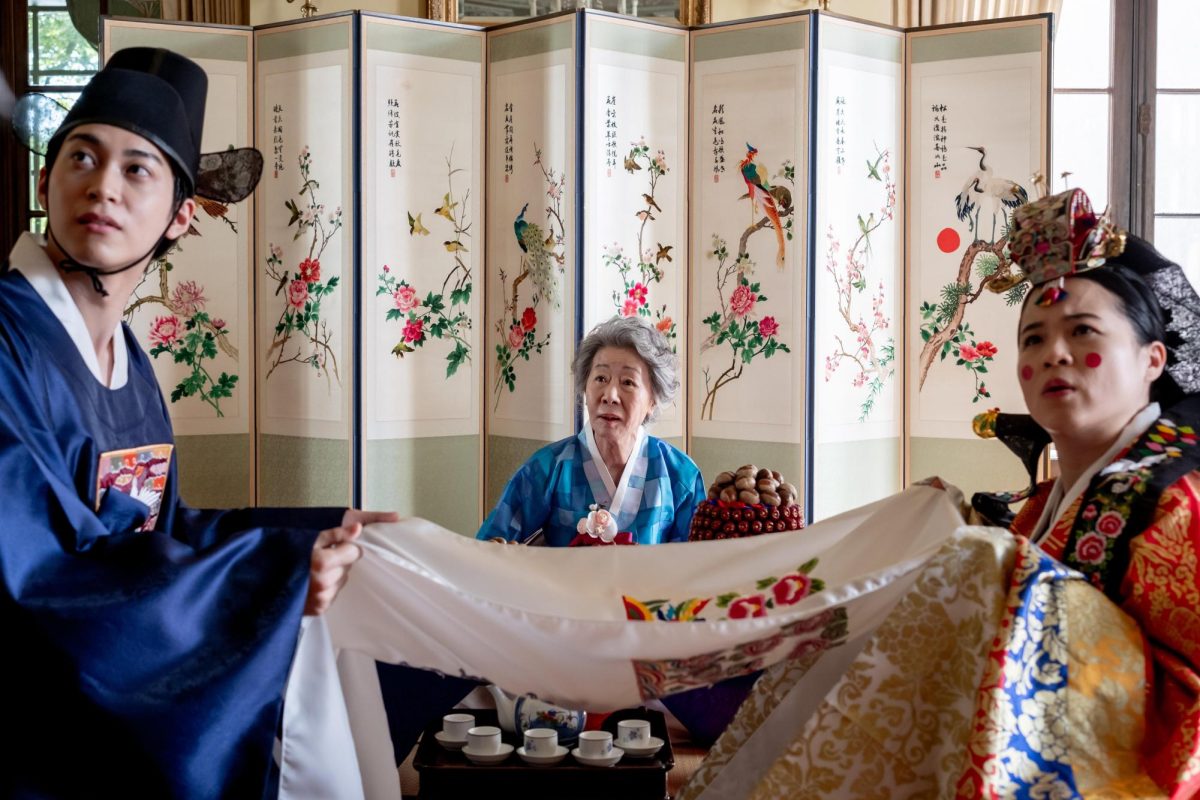The sound of Chinese drums beating opens Andrew Ahn’s film, “The Wedding Banquet.” A lion dancer appears, expertly moving with tradition and care. Then, in a shocking twist, the head of the lion dancer lifts and a drag queen’s face appears, welcoming the audience to an LGBTQ+ twist on a classic story of weddings and secrets.
Drag queens don’t feature in Ang Lee’s 1993 film of the same name, the source material for Ahn’s remake. The original follows Gao Wai-Tung, a gay, Taiwanese landlord in the United States, who marries Wei-Wei, one of his tenants, to both get her a green card and appease his nagging parents. When those traditionalist parents visit America, the couple must put on the front of marriage and hide Wai-Tung’s boyfriend, Simon. Ahn and James Schamus, who co-wrote the remake’s script, shifted plot details around so the story still lands in 2025 — and addresses the crucial detail that same-sex marriage is now legal.
The faux-happy couple this time around is Min (Han Gi-chan) and Angela (Kelly Marie Tran). With Min’s boyfriend Chris (Bowen Yang) too decision-averse to commit to a marriage, he looks to Angela so he can avoid moving back to Korea to work for his family business. Meanwhile, Angela and her girlfriend, Lee (Lily Gladstone), are running out of money while unsuccessfully trying in vitro fertilization — money that Min will gladly supply in return for the marriage.
Ahn divulges the couples’ knotty details with some exposition-heavy scenes stitched together with jump cuts, making the opening somewhat of a tonal rollercoaster. But once Ja-Young (Youn Yuh-jung), Min’s grandmother, flies to America for the celebrations, the impending wedding bells cause all the characters to panic, and the movie kicks into high gear. Chris yells, “We gotta de-queer this house,” and a hilarious montage ensues where the four friends — who all live together — hide every piece of LGBTQ+ paraphernalia they own, from Elliot Page’s memoir “Pageboy” to a DVD of “Portrait of a Lady on Fire.”
But what’s really interesting about “The Wedding Banquet” is the direction the movie goes after this point. In the 1993 film, Wai-Tung spends much of the movie hiding his gay life from his parents. But in Ahn’s version, Ja-Young quickly susses out the details of Min’s life, and even becomes an abettor in their scheme. With the central secret out of the way, Ahn freely explores the intrapersonal dynamics between the friend group and the parents.
The result is a heartfelt, romantic film as the characters struggle to navigate the realities of LGBTQ+ life and marriage in the 21st century. Ja-Young learns to accept her gay grandson with help from May (Joan Chen), Angela’s mother who organizes meetings at a local LGBTQ+ parents’ advocacy group and dances wildly with drag queens. But Angela sees her mother’s activism as performative, remembering the months after she came out when May refused to talk to her. Angela struggles to voice her fear that she will turn out like her mother to Lee, just as Chris refuses to make long-term plans with Min.
Ahn explores his characters sympathetically and the screenplay considers all sides equally. In an especially emotional scene where tensions come to a head between the four friends, Ahn intercuts shots of their quarrels with close-ups of Ja-Young’s pained face.
The cast uniformly delivers on both the movie’s comedy and emotion. Tran and Gladstone especially present a grounded, realistic lesbian romance that, despite hardships, still succeeds due to love. Yang, however, struggles the most with Chris’ conflicting emotions: In arguments, he delivers lines in the same intonation he gives his characters on “Saturday Night Live.”
The real stars of “The Wedding Banquet” are Chen and Youn as the two maternal figures trying to help their children. They both offer new perspectives on timeworn character archetypes: Chen as the overbearing immigrant mother, trying to reconnect with her daughter through activism, and Youn as the imperious grandmother, who comes around to accepting her grandson.
Near the end of the movie, their characters sit down to talk in the only real wedding banquet in the movie. It’s a quieter banquet — another of Ahn’s subversions, as Lee’s original featured a thunderously food-filled celebration. They toast, to the newlyweds and to new beginnings as they navigate the 21st century together with heart and humor.
Contact Ethan Li at [email protected].
























































































































































